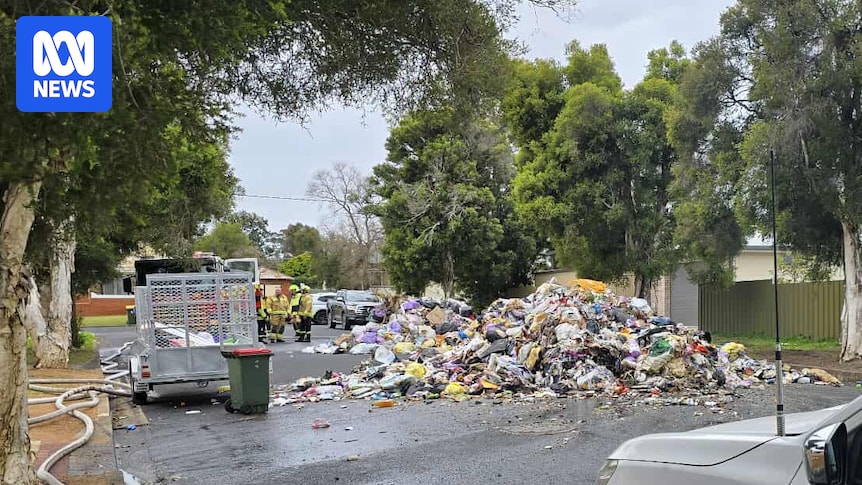It took just eight seconds and one embedded battery for a routine garbage run to end with 15 tonnes of rubbish dumped on a suburban Western NSW street.
Footage released by Dubbo Regional Council shows a garbage truck’s load catching fire, moments after a household’s red-lidded bin containing a battery-powered device was emptied and compacted.
Council’s resource recovery and efficiency manager, Jamie Lobb, said the compactor likely crushed the battery, sparking a fire that forced the driver to dump the entire load onto the street.
A fire sparked by an embedded battery caused 15 tonnes of rubbish to be dumped on a Dubbo street. (ABC Western Plains: Nick Lowther)
“The garbage truck was quite full at the time, so the ignition occurred quite quickly,” he said.
“But it was a pretty quick response from the driver who had to decant that load on the road.”
The single-battery incident triggered an extensive, hours-long response.
Two Fire and Rescue NSW trucks were called to extinguish the blaze, while two police cars managed traffic, and council crews used skip bins, a bobcat and street sweepers to clear the scene.
“We were there for the best part of half a day, so it’s a lot of resources needed for one battery being placed in the bin,” Mr Lobb said.What’s the danger?
Any appliance with a non-removable power cell, from smart watches and old iPods to vapes and e-scooters, contains an embedded battery.
These, along with loose household batteries, are classified as hazardous waste and should never be placed in household bins.
When crushed, lithium-ion and other batteries can spark or overheat.
In a truck full of combustible rubbish, that can lead to fire within seconds.
It took two Fire and Rescue NSW crews to contain the blaze. (ABC Western Plains: Nick Lowther)
Mr Lobb said while truck hoppers are fitted with cameras, drivers can’t spot everything before the compactor engages.
“This battery must have unfortunately hit a sweet spot and ignited straight away,” Mr Lobb said.
“It could have been catastrophic if the fire was left to burn in there over a significant period of time.”
“We’re fortunate there hasn’t been an extreme event where we have lost a vehicle, or there’s been a save-driver incident, but now we have a good opportunity to promote correct disposal of batteries.”
According to an industry-wide survey conducted by the Australian Council of Recycling and the Waste Contractors and Recyclers Association, more than 1,600 battery-related fire and heat events occurred in NSW waste and recycling facilities in 2024.
The contents of the garbage truck were dumped on the suburban road as the fire was extinguished. (Supplied: Dubbo Regional Council)
Mr Lobb said that while this was Dubbo’s first major truck fire in months, similar incidents were becoming increasingly common across Australia’s waste sector.
“We had a smaller one previously, but not to this extent,” he said.
“But we’re starting to see fires through the kerbside bins definitely become more prevalent. We’re also getting spot fires at landfill and spot fires at our resource transfers station where our yellow bin recyclable material goes.
“It’s definitely an emerging challenge that the industry is looking to see how best we can tackle.”How to dispose of batteries safely
Batteries should always be taken to designated recycling points, which are offered by many councils and some retailers across Australia.
In Dubbo, the council offers free recycling for household batteries and small embedded devices at drop-off points in the Dubbo and Wellington council administration buildings and libraries.
Council’s Jamie Lobb says it’s a timely reminder for households to dispose of batteries safely. (Supplied: Dubbo Regional Council)
Larger embedded batteries, from scooters and e-bikes, can be taken to the Whylandra Waste and Recycling Facility under a NSW EPA trial program.
Some private businesses, including battery retail stores and Officeworks, also host recycling cabinets.
Mr Lobb said the council planned to expand +drop-off points to make safe disposal easier.
“It’s something we’re definitely looking at … to stop the temptation of putting the batteries in the bins,” he said.

